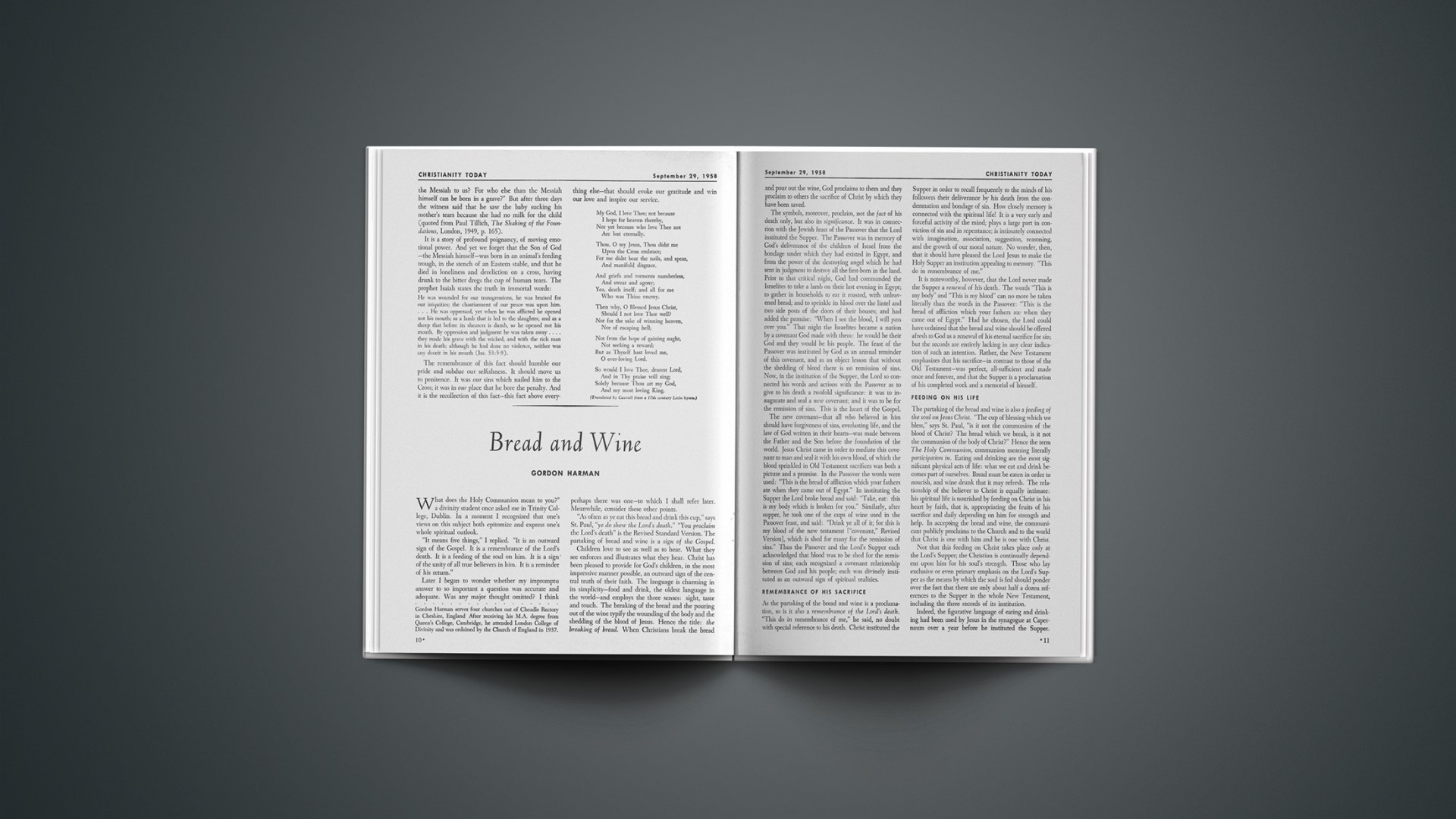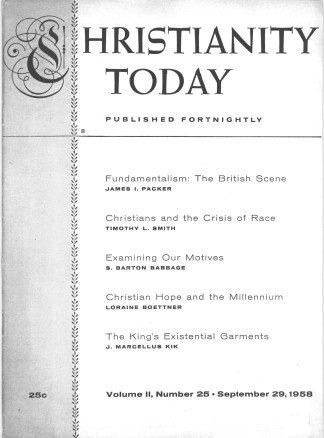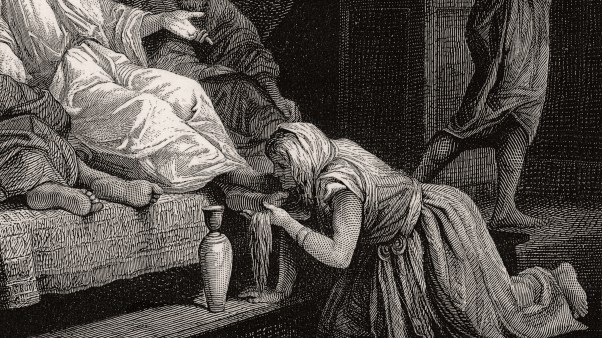What does the Holy Communion mean to you?” a divinity student once asked me in Trinity College, Dublin. In a moment I recognized that one’s views on this subject both epitomize and express one’s whole spiritual outlook.
“It means five things,” I replied. “It is an outward sign of the Gospel. It is a remembrance of the Lord’s death. It is a feeding of the soul on him. It is a sign of the unity of all true believers in him. It is a reminder of his return.”
Later I began to wonder whether my impromptu answer to so important a question was accurate and adequate. Was any major thought omitted? I think perhaps there was one—to which I shall refer later. Meanwhile, consider these other points.
“As often as ye eat this bread and drink this cup,” says St. Paul, “ye do shew the Lord’s death.” “You proclaim the Lord’s death” is the Revised Standard Version. The partaking of bread and wine is a sign of the Gospel.
Children love to see as well as to hear. What they see enforces and illustrates what they hear. Christ has been pleased to provide for God’s children, in the most impressive manner possible, an outward sign of the central truth of their faith. The language is charming in its simplicity—food and drink, the oldest language in the world—and employs the three senses: sight, taste and touch. The breaking of the bread and the pouring out of the wine typify the wounding of the body and the shedding of the blood of Jesus. Hence the title: the breaking of bread. When Christians break the bread and pour out the wine, God proclaims to them and they proclaim to others the sacrifice of Christ by which they have been saved.
The symbols, moreover, proclaim, not the fact of his death only, but also its significance. It was in connection with the Jewish feast of the Passover that the Lord instituted the Supper. The Passover was in memory of God’s deliverance of the children of Israel from the bondage under which they had existed in Egypt, and from the power of the destroying angel which he had sent in judgment to destroy all the first-born in the land. Prior to that critical night, God had commanded the Israelites to take a lamb on their last evening in Egypt; to gather in households to eat it roasted, with unleavened bread; and to sprinkle its blood over the lintel and two side posts of the doors of their houses; and had added the promise: “When I see the blood, I will pass over you.” That night the Israelites became a nation by a covenant God made with them: he would be their God and they would be his people. The feast of the Passover was instituted by God as an annual reminder of this covenant, and as an object lesson that without the shedding of blood there is no remission of sins. Now, in the institution of the Supper, the Lord so connected his words and actions with the Passover as to give to his death a twofold significance: it was to inaugurate and seal a new covenant; and it was to be for the remission of sins. This is the heart of the Gospel.
The new covenant—that all who believed in him should have forgiveness of sins, everlasting life, and the law of God written in their hearts—was made between the Father and the Son before the foundation of the world. Jesus Christ came in order to mediate this covenant to man and seal it with his own blood, of which the blood sprinkled in Old Testament sacrifices was both a picture and a promise. In the Passover the words were used: “This is the bread of affliction which your fathers ate when they came out of Egypt.” In instituting the Supper the Lord broke bread and said: “Take, eat: this is my body which is broken for you.” Similarly, after supper, he took one of the cups of wine used in the Passover feast, and said: “Drink ye all of it; for this is my blood of the new testament [“covenant,” Revised Version], which is shed for many for the remission of sins.” Thus the Passover and the Lord’s Supper each acknowledged that blood was to be shed for the remission of sins; each recognized a covenant relationship between God and his people; each was divinely instituted as an outward sign of spiritual realities.
Remembrance Of His Sacrifice
As the partaking of the bread and wine is a proclamation, so is it also a remembrance of the Lord’s death. “This do in remembrance of me,” he said, no doubt with special reference to his death. Christ instituted the Supper in order to recall frequently to the minds of his followers their deliverance by his death from the condemnation and bondage of sin. How closely memory is connected with the spiritual life! It is a very early and forceful activity of the mind; plays a large part in conviction of sin and in repentance; is intimately connected with imagination, association, suggestion, reasoning, and the growth of our moral nature. No wonder, then, that it should have pleased the Lord Jesus to make the Holy Supper an institution appealing to memory. “This do in remembrance of me.”
It is noteworthy, however, that the Lord never made the Supper a renewal of his death. The words “This is my body” and “This is my blood” can no more be taken literally than the words in the Passover: “This is the bread of affliction which your fathers ate when they came out of Egypt.” Had he chosen, the Lord could have ordained that the bread and wine should be offered afresh to God as a renewal of his eternal sacrifice for sin; but the records are entirely lacking in any clear indication of such an intention. Rather, the New Testament emphasizes that his sacrifice—in contrast to those of the Old Testament—was perfect, all-sufficient and made once and forever, and that the Supper is a proclamation of his completed work and a memorial of himself.
Feeding On His Life
The partaking of the bread and wine is also a feeding of the soul on Jesus Christ. “The cup of blessing which we bless,” says St. Paul, “is it not the communion of the blood of Christ? The bread which we break, is it not the communion of the body of Christ?” Hence the term The Holy Communion, communion meaning literally participation in. Eating and drinking are the most significant physical acts of life: what we eat and drink becomes part of ourselves. Bread must be eaten in order to nourish, and wine drunk that it may refresh. The relationship of the believer to Christ is equally intimate: his spiritual life is nourished by feeding on Christ in his heart by faith, that is, appropriating the fruits of his sacrifice and daily depending on him for strength and help. In accepting the bread and wine, the communicant publicly proclaims to the Church and to the world that Christ is one with him and he is one with Christ.
Not that this feeding on Christ takes place only at the Lord’s Supper; the Christian is continually dependent upon him for his soul’s strength. Those who lay exclusive or even primary emphasis on the Lord’s Supper as the means by which the soul is fed should ponder over the fact that there are only about half a dozen references to the Supper in the whole New Testament, including the three records of its institution.
Indeed, the figurative language of eating and drinking had been used by Jesus in the synagogue at Capernaum over a year before he instituted the Supper. I am the living bread which came down from heaven.… If any man will eat of this bread, he shall live for ever: and the bread that I will give is my flesh, which I will give for the life of the world.… Whoso eateth my flesh and drinketh my blood hath eternal life; and I will raise him up at the last day. For my flesh is meat indeed, and my blood is drink indeed. He that eateth my flesh and drinketh my blood dwelleth in me and I in him. As the living Father hath sent me, and I live by the Father: so he that eateth me, even he shall live by me.
When his words puzzled and offended some of his disciples, Jesus went on to explain: “The words that I speak unto you, they are spirit and they are life,” and he did not mean them literally. By his death, eternal life was to be made available to all. Just as food and drink must be consumed in order to bring physical benefit, so must the fruit of his death be personally appropriated in order to give spiritual life. By so appropriating the benefits of Christ’s sacrifice, the believer would be mysteriously united with him—even as he is with his Father—in a lifegiving relationship.
Sign Of Our Unity
“We being many are one bread and one body,” says St. Paul, “for we are all partakers of that one bread.” The Supper has its social significance. It is a sign of the unity of all believers in Christ. The eating of the one loaf and drinking of the one cup are symbolic of the holy bond which unites in one body—the Church—all who partake of the benefits of Christ’s sacrifice. Thus the Supper is the supreme symbol of fellowship. “Take this and divide it among yourselves,” said the Lord, after he had taken the cup and given thanks. By eating and drinking together, the children of God declare they are one family in the Church of Jesus Christ; they enjoy hallowed affection and brotherly love, with all fellow-pilgrims to the heavenly home and fellow-heirs of future glory.
Consequently, it is a sign also of separation. The Egyptians had no part in the Passover, unless any of them were to adopt Jehovah as their God. The scribes and Pharisees were not invited to the Lord’s Supper. Judas, so far as we can judge, left the supper room before the Supper was instituted. True Christians alone have any right to the holy table; that is why churches should require certain qualifications for attendance.
Though all true Christians have a right to the Lord’s table, even they must take heed to partake worthily. Owing to its connection with the agape, or love-feast—a social gathering of Christians—the Lord’s Supper in the Corinthian Church had become corrupted by divisions, pride, selfishness and irreverence. “Whosoever shall eat the bread or drink the cup of the Lord unworthily,” wrote St. Paul to them, “shall be guilty of the body and the blood of the Lord. But let a man prove himself, and so let him eat of the bread, and drink of the cup. For he that eateth and drinketh, eateth and drinketh judgment unto himself, if he discern not the body.” The word “judgment” in this Revised Version and “damnation” in the Authorized means “chastening,” as is indicated in the apostle’s later words: “But when we are judged, we are chastened of the Lord, that we should not be condemned with the world.” These are solemn words. Any Christian who approaches the Lord’s Supper in a spirit of levity draws his Father’s chastening hand upon himself.
Not that we can ever be worthy of Christ or free from all sin. What he requires is that we should trust him as our Saviour, recognize him as our Life, yield ourselves to him as our Lord, and confess him before men. This relation to him must be deeply sincere. The Passover was to be eaten with unleavened bread; and leaven, being a kind of corruption, was an emblem of insincerity and falsehood. The faith which saves is not the outward profession of those who deceive themselves or others, but that of the sincere heart. It would be inconsistent, moreover, to employ the sign of unity with one another without a corresponding reality. Christians should, therefore, seek to repair any quarreling among themselves before partaking together.
Reminder Of His Return
The Supper is also a reminder of the Lord’s return. “I will not drink henceforth of this fruit of the vine,” said Jesus at the institution, “until that day when I drink it new in my Father’s kingdom.” “As often as ye eat this bread and drink this cup,” says St. Paul, “ye do shew the Lord’s death till he come.” The sacred feast is limited in duration and purpose. During this age the people of God walk by faith in an invisible, ascended Lord. How precious, sacred and significant to them are the symbols which he ordained! But memory not only recalls the past; it enlarges expectation. The Christian looks forward to the joy of sharing in his marriage supper. In that glorious day, faith shall give place to sight; hope to realization; promise to fulfillment. With the Lord himself in the midst, the sacred symbols shall vanish away.
A Means Of Grace
I said at the beginning that there was one other import in the Supper. It includes and depends on all the other points. The Supper is a means of grace by which God works in the hearts of the faithful. As the Lord’s people proclaim him, recall him, thank him, feed on him, acknowledge their unity with one another in him, and expect his return from heaven, they cannot but be blessed. They may feel refreshed and uplifted; they may not. But God has repaired and renewed the innermost springs of their spiritual life. And in his strength they go on their way rejoicing.
Gordon Harman serves four churches out of Cheadle Rectory in Cheshire, England After receiving his M.A. degree from Queen’s College, Cambridge, he attended London College of Divinity and was ordained by the Church of England in 1937.










